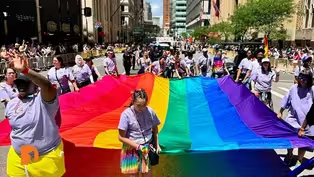
Historic Jackson Home finds a new life at The Henry Ford’s Greenfield Village
Clip: Season 9 Episode 49 | 8m 9sVideo has Closed Captions
The Henry Ford brings the historic Jackson Home 1,060 miles from Alabama to Michigan.
A key piece of civil rights history has arrived at The Henry Ford's Greenfield Village. One Detroit contributor Stephen Henderson talks with The Henry Ford President and CEO Patricia Mooradian and Amber Mitchell, curator of Black History, about the Jackson Home, a strategizing hub for Dr. Martin Luther King, Jr. and other civil rights leaders in 1965 during the fight for voting rights.
Problems playing video? | Closed Captioning Feedback
Problems playing video? | Closed Captioning Feedback
One Detroit is a local public television program presented by Detroit PBS

Historic Jackson Home finds a new life at The Henry Ford’s Greenfield Village
Clip: Season 9 Episode 49 | 8m 9sVideo has Closed Captions
A key piece of civil rights history has arrived at The Henry Ford's Greenfield Village. One Detroit contributor Stephen Henderson talks with The Henry Ford President and CEO Patricia Mooradian and Amber Mitchell, curator of Black History, about the Jackson Home, a strategizing hub for Dr. Martin Luther King, Jr. and other civil rights leaders in 1965 during the fight for voting rights.
Problems playing video? | Closed Captioning Feedback
How to Watch One Detroit
One Detroit is available to stream on pbs.org and the free PBS App, available on iPhone, Apple TV, Android TV, Android smartphones, Amazon Fire TV, Amazon Fire Tablet, Roku, Samsung Smart TV, and Vizio.
Providing Support for PBS.org
Learn Moreabout PBS online sponsorship(gentle electronic music) - Let's start with what this house is, I don't think a lot of folks who even know much about Martin Luther King Jr. or the civil rights movement know about this house, Amber, I'll start with you, why is this an important symbol?
- Absolutely, what a great question, so the Jackson home, the Dr. Sullivan and Richie Jean Sherrod-Jackson home was the home of a family, most importantly, a family who opened up their doors to their close personal friend, Dr. Martin Luther King, in 1965, as well as his lieutenants as part of the Southern Christian Leadership Conference to help coordinate what became the Selma-to-Montgomery marches of 1965 and help plan out the Voting Rights Act.
Essentially, what this family did is take it on the chin, essentially, for a lot of Americans during this time period, welcoming in who... You know, this person who was a great friend to them, but for many others, was public enemy number-one.
This is him also coming on the backs of many other organizers that are already there in Selma, but I think what makes this story really interesting and really rich is that it's a story of an ordinary everyday family who did something extraordinary, but also, it allows us to talk about this really interesting intersection of justice, family and community all under the lens of American citizenship.
- And now, it's ours, it's in our community, permanently, right?
- It is, we got a call from Joanna Jackson, Joanna is the daughter of Dr. Sullivan Jackson and Richie Jean Jackson, and she's the only child, only... And she wanted to preserve this house in perpetuity, her parents had since passed, she doesn't live in Selma, and she grew up in this home, she understands the significance in her family, an incredible story, not just what they did, as Amber said, but that they preserved the things that were there from that time period, they understood the significance of it, and Joanna made a promise to her parents that she would do whatever she could to preserve the stories of the home, and she did for many years on her own.
She would travel back and forth, meeting visitors and giving them tours, and pretty much out of the blue, we got a call from Joanna in February of '22, and she very passionately explained the significance of this home and what her ideas were to preserve it, and she basically said, "Patricia, this home belongs in Greenville Village," and, you know, we took it from there, and we really did a lot of homework and a lot of research, so it didn't actually leave Selma until the end of '23, and now, it's being restored in Greenfield Village.
- Yeah, you have other important markers from this time at the museum, I'm not sure everyone knows about that, but, of course, I've been to the museum and sat on the bus where Rosa Parks also sat in Montgomery.
- And we're an American history museum, we tell the stories of American innovation, and we consider social transformation an American innovation, and so, we tell the story of freedom and our rights as citizens for freedom in this country, democracy, in an exhibit called "With Liberty and Justice for All," and that's where the Rosa Parks bus is, that's where we tell some of the things...
Stories about civil rights, there are tremendous connections to what happened in 1955 with the bus to what happened in 1965 with this home.
- You were talking about the things that have been preserved, that the... She's...
The daughter has spent a lot of time making sure they're preserved, what are some of those things?
- Absolutely, so... Oh, it is a wonderful treasure trove, to be honest, probably the most important piece, or one of the most important pieces, is the chair that Dr. Martin Luther King sat in on the night of March 15th, 1965, as Lyndon Baines Johnson delivered his "we shall overcome" speech, and we have photos of Dr. King in that living room, as well as all the other people who were in that living room and all of the things in it, and so, using a combination of the things that the family has held onto, family records, photos, family photos, as well as press photos because this is a very well-documented event, it's a very well-documented house, we're able to see, like, the vast majority of these things are all original, they're all here and they're all gonna be going back into the house when it opens in summer 2026, so it is... We're doing some really awesome history detective work when it comes to bringing the house back to life, because, you know, it was well-loved and well-lived-in until 2013 or so, before it became a museum on its own, so it is real important work, but it's also just really cool to be able to bring a more modern story to Greenfield Village.
- And the fact that the family knew the significance and saved all these things... - And saved those things, right?
- They saved these things, we've even found, for instance, if they recovered or reupholstered a chair, they saved the original fabric underneath, so we're finding the fabrics that were used, we're finding wallpaper on the walls, it's an incredible history that's coming to life, and our curators and our conservators, like Amber just said, they're like detectives, and they're matching up the treasure trove of photographs with the things that we're finding in the collection, because when we moved the house, everything came with it.
- Right.
Right.
- Exactly, and I will say, we also, you know, have the awesome opportunity of having Ms. Richie Jean's voice, she wrote a book about her family's experiences in the home called "The House by the Side of the Road," and if you wanna know what our interpretation is, just pick up that book... - [Stephen] That's what you were using.
- Because she walks us through every room, she walks us through that whole time period, and we don't often get to have a narrative of not only the person who lived in the house and experienced this, but also, their daughter who also was there.
- She was there, and she was a little girl, so she...
The very first meeting we had with her when she... And we were on a Zoom call 'cause it was still kind of that COVID time period, right?
So we did a Zoom call, and she was referring to her Uncle Martin, and it took me a second, I thought, "Wait a minute."
(people laughing) - [Stephen] "She's talking about Martin Luther King."
- She's talking... Yeah.
"That's my Uncle Martin."
So there are some wonderful pictures and she has a lot of very, very fond memories of Dr. King and a lot of the people that were in her home during that time period, but it was also a scary time for them.
- So, you know, you described this moment where she just kind of reaches out to the Henry Ford and says, "This is the place that I think this should be," I mean, that's such a testament to the museum's power across the country, not just here in Southeast Michigan.
- Well, my first question was, "How did you find out about us?
How did you know about us?"
And she actually had some friends that were working with her that were in the museum research area and curatorial area, and they were doing a little digging, but there was an interesting story, she was giving a tour to an attorney who writes... Who works in the civil rights world in Washington, D.C., and he had brought some of his students down he teaches to, and they toured the house in Selma, and he pulled her aside and he said, "This house belongs in Greenville Village," so he whispered this to her a few years before she called us, and it got her thinking, and then, some of... And then, her curator colleagues also did some research, she really did her homework, she knew what we could do and she knew that this story needed to be told, and it needed to be preserved.
Detroit mayoral candidates share their visions for business and development in the city
Video has Closed Captions
Clip: S9 Ep49 | 12m 46s | One Detroit contributors Stephen Henderson and Nolan Finley moderate a Detroit mayoral debate. (12m 46s)
One Detroit Weekend | Things to do around Detroit this weekend: June 6, 2025
Video has Closed Captions
Clip: S9 Ep49 | 1m 59s | Ways to celebrate Pride Month and more events coming up around metro Detroit this weekend. (1m 59s)
Providing Support for PBS.org
Learn Moreabout PBS online sponsorshipSupport for PBS provided by:
One Detroit is a local public television program presented by Detroit PBS













